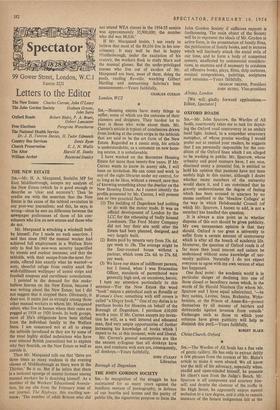OXFORD ROADS
SIR,—Mr. John Sparrow, the Warden of All Souls, courteously takes me to task for depict- ing the Oxford road controversy in an unduly lurid light. Indeed, in a somewhat unsavoury metaphor, of whose precise wording I would prefer not to remind your readers, he suggests that I am personally responsible for the con- dition of the Oxford linen which I am alleged to be washing in public. Mr. Sparrow, whose urbanity and good manners have, I am sure, disarmed many a potential foe, is entitled to hold his opinion that passions have not been unduly high in this matter, although I doubt whether many members of the university would share it, and I am convinced that he gravely underestimates the degree of feeling which has been aroused in quarters by no means confined to the 'Meadow Colleges' at the way in which Hebdomadal Council (of which Mr. Sparrow, I hasten to add, is not a member) has handled this question.
It is always a nice point as to whether disputes of this sort should be given publicity. My own unrepentant opinion is that they should. Oxford is too great a university to suffer from a certain amount of controversy which is after all the breath of academic life. Moreover, the question of Oxford roads is of far more than local interest and cannot be understood without some knowledge of uni- versity politics. Naturally I do not expect everyone to agree with my own version of what has happened.
One final point : the academic world is in particular danger of declining into one of those closed or hereditary castes which, in the words of Sir Harold Nicolson (for whom Mr. Sparrow and I have equal admiration), `—be they nobles, Levites, Incas, Brahmins, Wyke- hamists, or the Priests of Amen-Ra--protect themselves by all manner of barriers and shibboleths against invasion from outside.' Exchanges such as those to which your columns have given publicity will help to diminish this peril.—Yours faithfully,
ROBERT BLAKE
Christ Church, Oxford


































 Previous page
Previous page